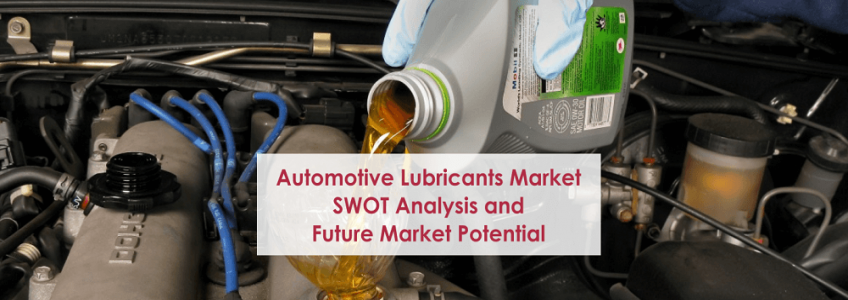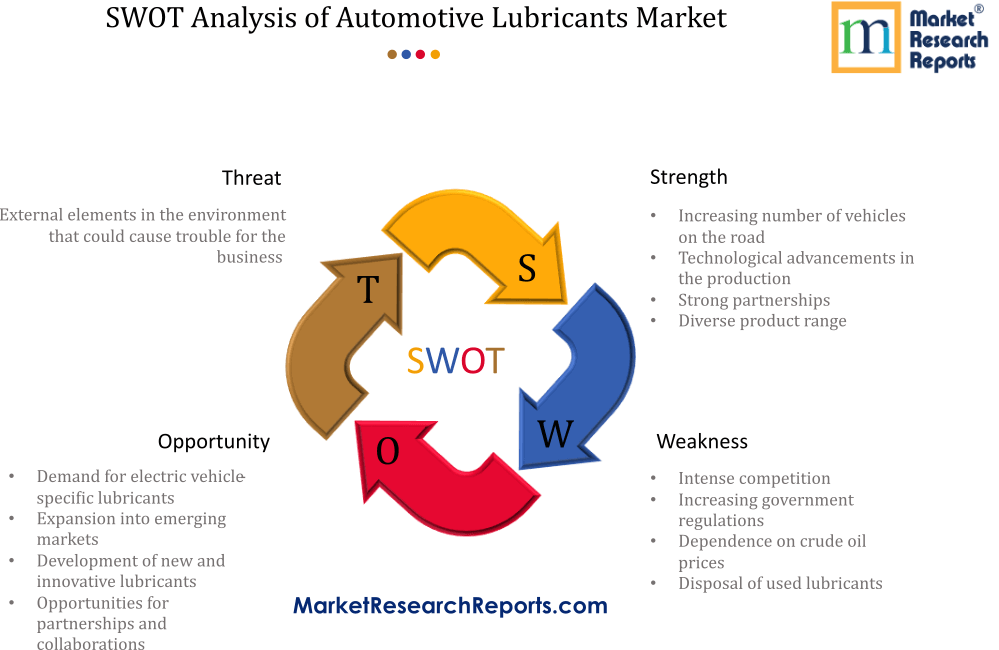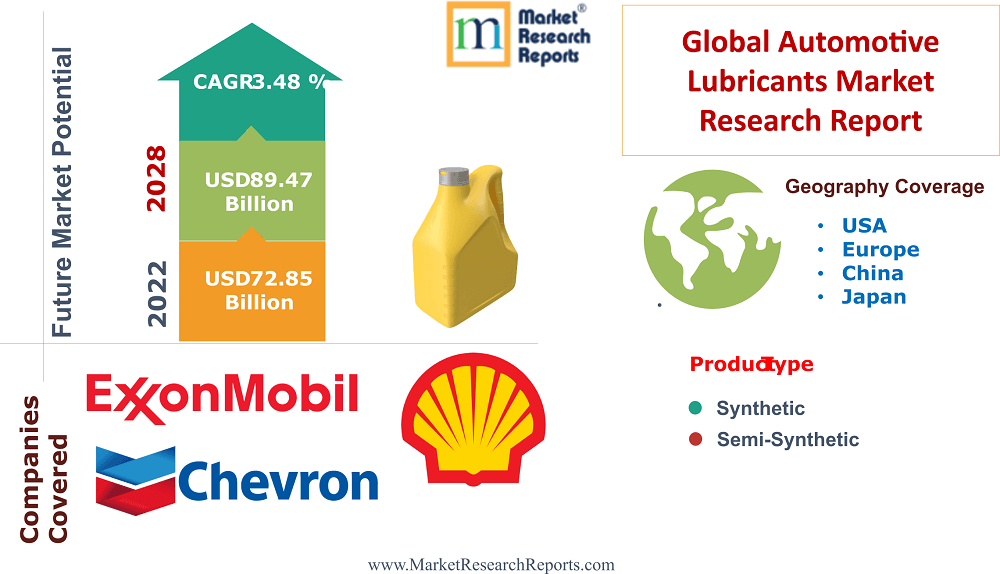Automotive Lubricants Market SWOT Analysis and Future Market Potential

Table of Contents
- Automotive Lubricants Market Scenario
- Automotive Lubricants Market Segmentation by Engine Type
- Automotive Lubricants Market Segmentation by Oil Type
- Automotive Lubricants Market Segmentation by Application
- Impact of COVID-19 on the Automotive Lubricant Industry
- SWOT Analysis of the Automotive Lubricants Market
- Automotive Lubricants Market Leaders
Automotive lubricants are a critical component of modern vehicles. These oils, greases, and other substances are designed to reduce friction and wear on mechanical parts, helping to keep the vehicle running smoothly and efficiently.
Lubricants are used in a wide range of applications in a vehicle, including the engine, transmission, and various other moving parts. In the engine, lubricating oil is used to coat the internal parts, such as the pistons and cylinder walls, helping to reduce friction and heat as the engine operates. This can help to improve fuel efficiency and extend the life of the engine.
1 . Automotive Lubricants Market Scenario
Suggested Reports for Marketers/Investors
Leading Market for Automotive Lubricants
2 . Automotive Lubricants Market Segmentation by Engine Type
- Gasoline lubricants are added to gasoline to reduce friction and wear on engine parts, improve fuel efficiency, and prevent the formation of deposits and varnishes. These lubricants are typically composed of a blend of base oils and various additives, such as detergents, dispersants, anti-wear agents, and antioxidants. The type and amount of lubricant added to gasoline may vary depending on the engine design and operating conditions.
- Diesel fuel lubricants are additives added to diesel fuel to improve its lubrication properties. These lubricants help to reduce friction and wear on engine components, resulting in improved fuel efficiency and engine performance. Some common diesel fuel lubricants include detergents, dispersants, and viscosity improvers. These additives are crucial for maintaining the overall health and performance of a diesel engine.
3 . Automotive Lubricants Market Segmentation by Oil Type
- Conventional automotive lubricants are the most commonly used type of lubricant in vehicles. They are made from mineral oil or synthetic base oil and typically contain additives to improve their performance and extend their lifespan. These lubricants protect engine parts from wear and tear, reduce friction, and improve engine performance. Some common conventional automotive lubricants include engine oil, transmission fluid, and gear oil.
- Synthetic automotive lubricants are a type of lubricant that is specifically designed for use in vehicles. These lubricants are made using artificial or synthetic materials, as opposed to traditional lubricants made from natural sources such as petroleum. Synthetic lubricants have a number of benefits over traditional lubricants. They are typically more resistant to breakdown and degradation, meaning they can last longer and provide better protection for vehicle components. They also have a higher viscosity index, which means that they are less likely to thin out at high temperatures and can provide better lubrication and protection for engine parts. Synthetic lubricants are also more environmentally friendly than traditional lubricants, as they are made from synthetic materials and do not contain harmful chemicals or pollutants. They are also more efficient, as they can reduce friction and wear on engine parts, resulting in better fuel efficiency and performance.
- Semi-synthetic automotive lubricants are a blend of synthetic and conventional lubricants that offer the benefits of both types of lubricants. They provide better protection against wear and tear, improved resistance to extreme temperatures, and better overall performance compared to conventional lubricants. They are also more resistant to breakdown and oxidation, which means they have a longer lifespan and can provide better protection for your vehicle. Semi-synthetic lubricants are commonly used in high-performance vehicles and are often recommended by manufacturers for use in modern engines.
4 . Automotive Lubricants Market Segmentation by Application
- Engine oil: This is the most important type of lubricant in a vehicle as it is responsible for lubricating the engine's moving parts. It is typically made from a blend of base oils and additives and is available in different viscosities to suit different engine types and operating conditions.
- Transmission fluid: This lubricant is used in the transmission system of a vehicle to lubricate the gears, bearings, and other moving parts. It is typically a thicker, more viscous fluid than engine oil and is also available in different viscosities to suit different transmission types.
- Gear oil: This lubricant is used in the differentials, axles, and other gear-driven components of a vehicle. It is typically a heavier, thicker oil than engine or transmission fluid, and is designed to withstand the high pressures and loads of gears.
- Brake fluid: This lubricant is used in the brake system of a vehicle to lubricate the brake calipers, pistons, and other moving parts. It is typically a very high-viscosity fluid that is designed to withstand the high temperatures and pressures of brake operation.
- Grease: This lubricant is used in the joints, bearings, and other lubrication points of a vehicle. It is typically a thick, semi-solid lubricant that is applied manually and adheres well to surfaces.
5 . Impact of COVID-19 on the Automotive Lubricant Industry
- The COVID-19 pandemic has had a significant impact on the automotive lubricants market. The widespread lockdowns and restrictions on movement have resulted in a decrease in the demand for automotive lubricants as people are using their vehicles less.
- This has led to a decrease in the production and sales of automotive lubricants. Companies are facing challenges in maintaining their supply chains and are struggling to meet the reduced demand.
- Additionally, the economic downturn caused by the pandemic has also impacted the purchasing power of consumers, leading to a decrease in the demand for automotive lubricants.
- The shift towards online sales and e-commerce has also led to changes in the distribution channels for automotive lubricants, with companies focusing on digital marketing and online sales to reach their customers.
- Overall, the COVID-19 pandemic has had a negative impact on the automotive lubricants market, leading to a decrease in production and sales, and challenging the industry to adapt to the changing market conditions.
6 . SWOT Analysis of the Automotive Lubricants Market

Strengths:
- High demand for automotive lubricants due to the increasing number of vehicles on the road
- Technological advancements in the production of lubricants resulting in improved performance and longer lifespan
- Strong partnerships with leading automotive manufacturers and service centers
- Diverse product range catering to the needs of different vehicles and conditions
Weaknesses:
- Intense competition from other lubricant manufacturers
- Increasing government regulations and standards regarding the production and disposal of lubricants
- Dependence on crude oil prices, which can impact the cost and availability of raw materials
- Potential negative impact on the environment due to the disposal of used lubricants
Opportunities:
- Growth in the electric vehicle market, leading to a potential increase in demand for electric vehicle-specific lubricants
- Expansion into emerging markets with growing automotive industries
- Development of new and innovative lubricants to improve performance and reduce environmental impact
- Opportunities for partnerships and collaborations with leading automotive manufacturers and service centers
Threats:
- Continued competition from other lubricant manufacturers leading to price wars and reduced profit margins
- Advancements in vehicle technology leading to longer intervals between oil changes, potentially reducing demand for lubricants
- Increased consumer awareness and concern for environmental impact, leading to a shift towards environmentally-friendly lubricants
- Economic downturns and downturns in the automotive industry impacting demand for lubricants.
7 . Automotive Lubricants Market Leaders
1. ExxonMobil
- Mobil 1 Advanced Fuel Economy: This lubricant is designed to improve fuel economy by reducing friction and wear on engine components. It has been tested and proven to improve fuel efficiency by up to 2% in a range of vehicle types.
- Mobil 1 Advanced Full Synthetic Motor Oil: This lubricant is designed to provide superior protection for high-performance engines. It is formulated with high-quality synthetic base oils and advanced additives to help extend engine life and improve fuel efficiency.
- Mobil Delvac 1 ESP: This lubricant is designed specifically for diesel engines and is formulated to provide excellent protection against wear, corrosion, and deposits. It is also designed to meet the latest emissions standards and help reduce fuel consumption.
- Mobil Super Synthetic Motor Oil: This lubricant is designed to provide enhanced protection for high-mileage engines. It is formulated with synthetic base oils and advanced additives to help prevent engine wear, reduce oil consumption, and extend engine life.
2. Shell
3. Chevron
4. BP
- BP Castrol Edge Titanium: This advanced engine oil is formulated with titanium technology to provide maximum protection for engines and reduce friction. It helps to improve fuel economy and reduce emissions.
- BP Castrol Magnatec: This engine oil is designed to protect engines from wear and tear, especially during start-up and high-stress driving conditions. It uses intelligent molecules that cling to metal surfaces to form a protective layer, helping to extend the life of engines.
- BP Castrol GTX: This engine oil is designed to help extend the life of older engines and provide maximum protection against sludge and deposits. It uses advanced cleaning technology to keep engines running smoothly and efficiently.
- BP Castrol Professional: This range of engine oils is designed for use in commercial vehicles and is formulated to meet the specific needs of different vehicles and applications. It includes various products, such as diesel engine oils, transmission oils, and hydraulic fluids.
- BP Castrol LubeCheck: This is a digital platform that provides real-time monitoring and analysis of lubricant performance. It helps to ensure that vehicles are using the suitable lubricants and that they are being used most efficiently and effectively.
5. TOTAL
Related Blog Post
- World’s Top 10 Automotive Aftermarket Suppliers
- Porter's Five Forces Analysis of Automotive Telematics Market and Industry Leaders






